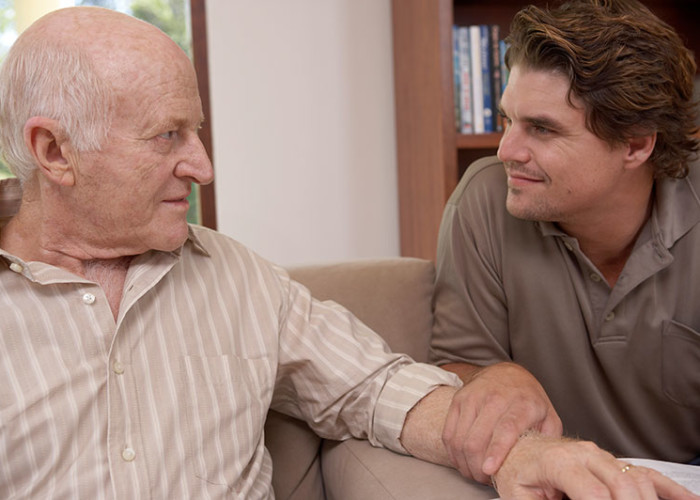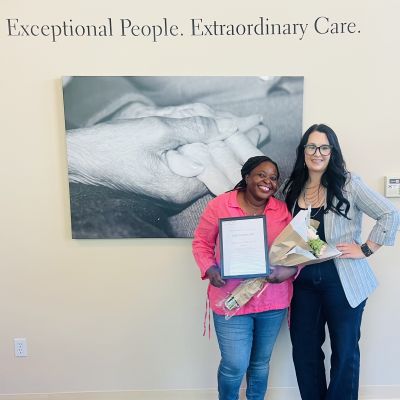Resistance to Care
How to Handle a Dementia Outburst in Public
If you’re unsure how to effectively defuse a dementia outburst in public, these strategies are for you!
Dementia is anything but predictable. A loved one’s mood, personality, and behaviors can shift without warning, making daily life feel like a constant balancing act. Managing these changes at home is one thing—but what about when you’re in a restaurant, grocery store, or waiting in line at the pharmacy; how should you handle a dementia outburst in public?
How to Overcome Family Denial of Home Care Needs
If you’re encountering family denial of home care needs for an older loved one, these tips will help everyone come to a place of agreement.
When you begin to notice the red flags that care in the home is required for someone you love, it’s very common for that individual to resist the idea. After all, acknowledging the need for assistance is not easy, especially for somebody who prizes their privacy and independence. Yet what do you do when you encounter family denial of home care needs for an older loved one? When you’ve reached an impasse within your family in regards to the need for senior care, there is one potential culprit to consider: denial.
Why Would a Family Member Deny the Need for Care in the Home?
Denial is a coping mechanism employed to protect against … Read More »
Tips to Overcome the Challenges of Medical Tests for Older Adults
Ease the process of medical tests for older adults with these tips.
There’s often nothing “routine” about a routine checkup. You may arrive to your appointment perfectly fine, but leave with orders for blood work along with other medical tests a doctor recommends to keep you as healthy as possible. These tests may be nothing more than a minor inconvenience for you, but medical tests for older adults could be challenging for many reasons: transportation problems, mobility issues, thinner skin, fragile veins, cognitive difficulties, and much more.
What to Do When a Parent Refuses Care
When a parent refuses care, these tips can help you come to a resolution.
Let’s say you’re starting to notice some warning signs that cause you to worry about Dad’s ability to continue to take care of himself. Perhaps he’s struggling to maintain the home the way he always has. Or maybe he had a close call while driving that could have caused injury to himself or another person. Maybe he just seems more disoriented lately. Whatever the reason, you’ve decided to talk with him about home care services. The problem is, he refuses to even entertain the idea. What are you to do when a parent refuses care that they desperately need?
If you’re at an impasse on how to proceed, these ideas can be helpful.
Let him know you’re in this together. Digging in your heels and … Read More »
The Health Concerns That Could Be Causing Chronic Negativity in an Older Loved One
If you’re noticing chronic negativity in an older loved one, there may be a medical condition to blame.
We all have good days and bad days, and we are all entitled to a bit of crankiness or negative thinking every now and then. If you are noticing a pattern of chronic negativity in an older loved one, however, it is worthwhile to explore whether a health problem might be the culprit.
Listed below are several reasons for persistent negativity, and how you can help.
Pain. A recent study revealed that participants who were enduring chronic pain reported a rise in negative moods, including fatigue, anger, tension, depression, anxiety, and more. It is essential to discuss any of these mood changes with the physician, as these kinds of mood changes actually impact the effectiveness of pain management treatments.
Urinary tract infections. … Read More »
What to Do When an Older Adult Refuses to Pay for Care
Many of today’s older adults grew up during the Great Depression. They lived through a time when the country was cutting corners and pinching pennies. Frugality was embedded in many of them at an early age and quite often remains firmly in place for life.
So what can you do when an older adult refuses to pay for care, even though they clearly are in need of care at home and have the financial ability to pay for the care?
First, empathize. Understand that the person’s perspective is valid and determined by past life experiences. If the older adult seems to be resistant to the idea of spending money for the care they need, remind yourself of the emotions behind the behaviors. An additional layer of difficulty may be in simply accepting the need for care altogether, something that … Read More »
How to Manage Feeling Unappreciated as a Caregiver
These three simple steps can help if you’re feeling unappreciated as a caregiver.
From the moment you started your day until its end, you’ve dedicated yourself entirely to the well-being of an older loved one. Your tasks ranged from assisting with daily activities to managing appointments and household chores, all performed with love and dedication. Yet, the acknowledgment you deserve is often absent, leaving you feeling unappreciated as a caregiver. Left unchecked, this can lead to caregiver burnout or depression.
If you’re experiencing this, know that you’re not alone. Here are some tips to help navigate and address the challenge of feeling unappreciated in your caregiving role.
1. Practice Self-Appreciation:
Acknowledge the importance of the work you’re doing and prioritize self-appreciation. Take a moment each week to reward yourself for a job well done. It … Read More »
How Should You Respond to Aggressive Behaviors in Dementia?
Remember the six R’s when responding to aggressive behaviors in dementia.
Of the many challenging behaviors common in Alzheimer’s, probably the most complicated to manage is aggression. A senior who has always been mild-mannered can abruptly lash out in outbursts that are truly alarming: hitting, cursing, kicking, yelling, biting, or throwing objects. How can you, as a family caregiver, safely help restore a sense of calm when confronted with aggressive behaviors in dementia?
To start with, remind yourself that the aggression is a consequence of the disease. It is not something the older adult can control, and it is not intentional. That said, it must be defused to keep both you and the senior safe from harm.
“The 6 R’s of Managing Difficult Behavior,” developed by Dr. Peter Rabins and Nancy Mace in their book The 36-Hour Day, … Read More »
Caregiver Anger: I Never Expected to Feel So Angry About Caring for Aging Parents!
If you’re feeling angry about dealing with aging parents, know that you’re not alone, and there are steps you can take to help. Contact us for help.
If you were to detail the top 5 emotions you encounter in meeting the caregiving needs of your aging parents, what would they be? Maybe you would first think of emotions like compassion, love, and sometimes, even frustration or stress. Would caregiver anger make the list? In many cases, though family caretakers wouldn’t wish to admit it, it’s quite common to feel angry about caring for aging parents. Read on to learn more about caregiver anger, and reach out to Hired Hands Homecare for the support you need to step away to care for yourself!
Concerned It Might Be Dementia? Here’s How to Bring It Up to the Doctor.
You may be afraid to talk with the doctor if you’re concerned it might be dementia, but these tips can help.
Distress. Embarrassment. Fear. If you’re concerned it might be dementia, the feelings surrounding a potential diagnosis can force you to keep your suspicions to yourself. An AARP survey peeled away some of the layers of emotion to find the reason – namely, worry over losing independence and becoming a burden to others.
While there is some truth to these worries, there are also some misconceptions fueling them. As an example, roughly 1/2 of the participants, who were adults age 40 and over, believe they’re likely to get dementia as they grow older. The truth is that just over 10% of older adults over age 65 are identified as having Alzheimer’s disease.
Because of this, it’s critical for … Read More »

















